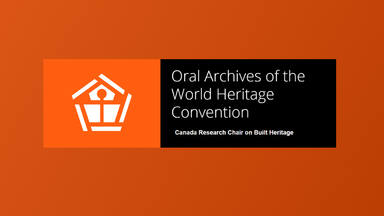Interview
Webber Ndoro
World Heritage Convention
Webber Ndoro is an archaeologist and Zimbabwean heritage expert. He holds a BA in History from the University of Zimbabwe, an MSc in Archeology from the University of Cambridge, and an MSc in Architectural Conservation from the University of York. He completed his studies at Uppsala University, Sweden where he obtained a doctorate in heritage management.
Webber Ndoro joined the National Museums and Monuments of Zimbabwe in 1985, where he was the Monuments Program Coordinator from 1992 to 1994. He then served as a lecturer in heritage management at the University of Zimbabwe, during which time he became aware of the 1972 Convention. He has also lectured on heritage management at the University of Bergen, Norway, as well as at the University of Cape Town, South Africa, where he is an honorary Professor.
From 1998 to 2007, Webber Ndoro worked within ICCROM for the Africa 2009 program. He then became Director of the African World Heritage Fund (AWHF), before returning to ICCROM in 2018 as Director General. He has published numerous articles and co-edited several books on the conservation of African heritage, including Managing Heritage in Africa: Who Cares? (Routledge, 2018) and Cultural Heritage Management in Africa: The Heritage of the Colonized (Routledge, 2022).
Interview with
Webber Ndoro
January 2023
The following audio extracts come from a virtual interview conducted with Webber Ndoro by Christina Cameron and Mechtild Rössler in January 2023. Mr. Ndoro offers a critical and pragmatic vision of the Convention and its application in the African context. He draws on his extensive experience at ICCROM and the AWHF to address issues of politicization, the role of Category 2 Centres, and the importance of involving local populations.
- 1. The World Heritage Convention
- 1a. Involvement of Webber Ndoro in World Heritage
- 1b. Key objectives of the Convention
- 1c. Balance between technical and political issues
- 1d. Decisions that influenced the implementation of the Convention
- 1e. Successes and failures of the Convention
- 2. The World Heritage Committee
- 3. Category 2 Centres
- 4. ICCROM training programs
- 5. The commitment of States Parties
- 6. The intentional destruction of World Heritage
- 7. The role of civil society in the Convention
Oral Archives of the
World Heritage Convention
Under the leadership of the Canada Research Chair on Built Heritage at the University of Montreal, an international team of researchers conducts interviews with pioneers of World Heritage to capture memories of important moments in the history of UNESCO Convention.
Launched in 2006, this initiative is part of the UNESCO History project that celebrated the 60th anniversary of the creation of UNESCO. The Oral Archives project records the precious witness of people closely associated with the creation and implementation of the Convention. Their recollections and views have greatly enriched the book by Christina Cameron and Mechtild Rössler, Many Voices, One Vision: The Early Years of the World Heritage Convention (Ashgate/Routledge, 2013).
